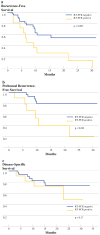Prognostic impact of RT-PCR-based detection of peritoneal micrometastases in patients with pancreatic cancer undergoing curative resection
- PMID: 19763694
- PMCID: PMC3275341
- DOI: 10.1245/s10434-009-0683-2
Prognostic impact of RT-PCR-based detection of peritoneal micrometastases in patients with pancreatic cancer undergoing curative resection
Abstract
Background: Positive peritoneal fluid cytology predicts poor outcome in patients with resected pancreatic cancer. Reverse transcription-polymerase chain reaction (RT-PCR) has been proposed as a more sensitive means of detection of peritoneal micrometastases than conventional cytology. The clinical significance of RT-PCR positivity in the absence of other evidence of peritoneal disease is unknown. The purpose of the current study was to determine the outcome RT-PCR positive/cytology-negative patients who underwent potentially curative resection.
Methods: Peritoneal washings were collected prospectively from 115 patients with pancreatic cancer undergoing diagnostic laparoscopy at a single institution. Specimens were analyzed by a cytopathologist and by RT-PCR for carcinoembryonic antigen (CEA).
Results: Of the 115 patients, 62 (54%) underwent R0 resection. Eleven of the 62 patients (18%) had peritoneal washings that were negative by conventional cytology but positive for CEA by RT-PCR. Those 11 patients experienced early peritoneal and overall disease recurrence versus those who were RT-PCR negative (P = 0.001, P = 0.003, respectively) independent of nodal status.
Conclusions: RT-PCR for CEA is a sensitive and specific method for the detection of clinically significant peritoneal micrometastases from pancreatic cancer and it might identify a subgroup of patients with otherwise negative findings at staging laparoscopy who might respond better to treatment other than primary surgical resection.
Figures



References
-
- House MG, Fong Y, Arnaoutakis DJ, et al. Preoperative predictors for complications after pancreaticoduodenectomy: impact of BMI and body fat distribution. J Gastrointest Surg. 2008;12(2):270–8. - PubMed
-
- Williams TK, Rosato EL, Kennedy EP, et al. Impact of obesity on perioperative morbidity and mortality after pancreaticoduodenectomy. J Am Coll Surg. 2009;208(2):210–7. - PubMed
-
- Bentrem DJ, Brennan MF. Outcomes in oncologic surgery: does volume make a difference? World J Surg. 2005;29(10):1210–6. - PubMed
-
- Mayo SC, Austin DF, Sheppard BC, et al. Evolving preoperative evaluation of patients with pancreatic cancer: does laparoscopy have a role in the current era? J Am Coll Surg. 2009;208(1):87–95. - PubMed
-
- Soriano A, Castells A, Ayuso C, et al. Preoperative staging and tumor resectability assessment of pancreatic cancer: prospective study comparing endoscopic ultrasonography, helical computed tomography, magnetic resonance imaging, and angiography. Am J Gastroenterol. 2004;99(3):492–501. - PubMed
MeSH terms
Substances
Grants and funding
LinkOut - more resources
Full Text Sources
Medical

